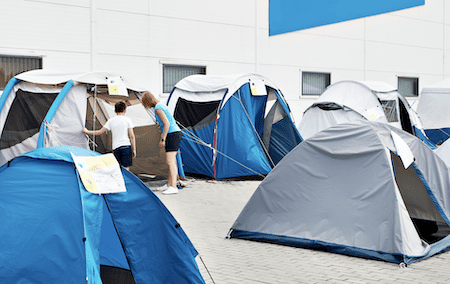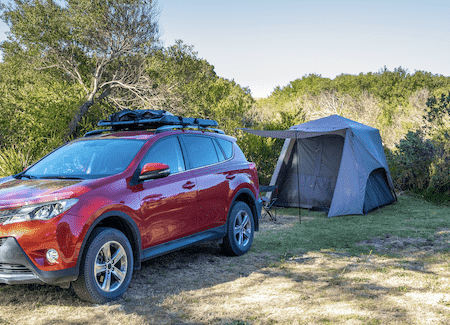When you’re looking for a new tent, one of the crucial factors to consider is the weight.
Tents can range in weight from just a few pounds to upwards of 20 pounds or more.
Obviously, the lighter the tent, the easier it will be to carry on your back.
For example, if you love car camping, weight isn’t a big deal since you won’t have to carry your tent all that far.
But if you’re backpacking, every ounce counts; the lighter your tent, the less fatigue you will feel at the end of a long day of hiking.
So, how much does a tent weigh? It really depends on the size and features that you need.
But if you are not aware of all this, do not worry, here in this discussion, we will give you an overview of different kinds of tents and show you examples of various tents so that you can choose the weight of your next tent wisely.
Different Kinds Of Tents And Their Categories
There are many kinds of tents out there, but if we want to categorize all the tents based on the carrying style, we will see all the tents mainly fall into two categories which are- Backpacking tents and Car or Family tents.
Backpacking Tent
A backpacking tent is a tent that is designed for backpacking and is typically used by hikers, backpackers, and mountain climbers.
This is why weight is a major fact in choosing a decent backpacking tent because carrying a heavy tent while hiking or climbing can drain your energy so quickly.
Car Tent
A car tent is a special type of tent that fits onto the back of your vehicle’s cargo space which is a great tent to go camping with your family members.
These tents are designed to use especially when you have a car to carry such a heavy load tent.
Car tents are usually a bit heavier than a backpacking tent and it is often called a family tent as it has more interior space for your family members.
Furthermore, based on the tent’s functionality and other necessary features we can classify all the Backpacking and Car or Family tents in the following categories:
| Based On Build Construction | For Different Weather | Based On Interior Space |
|---|---|---|
| Single Wall Tent | 2/3 Season Tent | One Person Tent |
| Double Wall Tent | 4 Season Tent | Multi-Person Tent |
A Single Wall Vs A Double Wall Tent
The most significant distinction between a single wall and a double-wall tent is in their structural design.
Basically, Single-wall tents have a single sheet of fabric that serves as both the rainfly and the inner wall.
Whereas, the double-wall tents feature a separate rain fly from the interior tent, which also works as a bug net.
In terms of weight and other features, Single Wall Tents are lighter and more comfortable than double-wall tents for early spring or late autumn, but not so much effective for bad weather or for 3/4 seasons.
A 3-Season Tent Vs A 4-Season Tent
The major difference between 3 and 4-season tents is in their durability against different weather conditions.
Three-season tents are built to withstand the typical weather conditions like mild rain, wind, light hail, and moderate cold whereas a 4-season tent is intended for all-weather situations and can withstand more extreme snow loads, high winds, harsh winters, and even blowing sand on a desert.
However, a three-season tent is much more lightweight and will be great for high ventilation during the summer when a four-season tent will always be heavier than a three-season tent, but this is vital when traveling out during the coldest months of the year.
One-Person Tent Vs Multi-Person Tent
The distinction between a one-person and a multi-person tent is simple.
A one-person tent can accommodate only one person on the inside whereas a multi-person tent offers more interior space to live together than a one-person tent.
Well, a multi-person tent comes in a variety of size categories. It can offer the space for 2, 4, 6, 8, 10, 12, or even 18 people or more to live together on a trip.
Additionally, many people are now preferring a two-person tent instead of a One-Person tent for their personal usage. Because the slightly wider space of a two-person tent may seem comfortable for single usage to some people.
So, How Much Does A Tent Weigh?
In the above section, I hope you all have learned a bit about the different kinds of tents and their various use cases; and now it’s time to drive to the main topic.
The weight of a tent, yes! The weight of a tent can be a game-changing factor for the entire camping experience.
In this section, we will try to demonstrate the usual weight of different types of tents through real examples.
The Usual Weight Of A Backpacking Tent
Backpacking tents must be lightweight because they are used for hiking and if you buy a heavy tent then carrying a tent in your bag can make you exhausted so quickly.
List Of 15 Backpacking Tents For 2 People
This list will help you choose your next backpacking tent according to how much weight you would love to bear on your hiking days.
| Tent Name | Packed Weight | Packed Size (Inch) | Interior Space (Sqft) |
|---|---|---|---|
| NEMO Hornet 2 | 2 lbs. 6 oz | 5.5 x 19.5 | 27.5 |
| Big Agnes Tiger Wall UL2 | 2 lbs. 8 oz | 5.5 x 18 | 28 |
| Big Agnes HV Copper Spur UL2 | 2 lbs. 11 oz | 6 x 19.5 | 29 |
| Mountain Hardwear Mineral King | 2.6 lbs. | 6 x 24 | 33 |
| MSR Hubba Hubba NX 2 | 3 lbs. 14. oz | 6 x 18 | 29 |
| Marmot Tungsten UL (2P) | 3 lbs. 6 oz | 7 x 24.5 | 30.6 |
| NEMO Dagger (2P) | 3 lbs. 14 oz | 19.5 x 6.5 | 31.3 |
| Sea to Summit TR2 | 3 lbs. 10oz | 5.1 x 18.9 | 28 |
| Big Agnes (Blacktail 2) | 4 lbs. 8 oz | 7 x 21 | 33 |
| MSR Access (2) | 4 lbs. 1 oz | 6 x 18 | 29 |
| Exped Lyra (2) | 4 lbs. 9 oz | 7.9 x 20.5 | 30.1 |
| Hilleberg Nallo 2 | 5 lbs. 5 oz | 6 x 19 | 28 |
| Hyke & Byke Yosemite 2P | 5 lbs. 6 oz | 6 x 17 | 33 |
| The North Face Stormbreak 2 | 5 lbs. 14 oz | 7 x 22 | 30.6 |
| REI Trail Hut Co-op 2 | 5 lbs. 15 oz | 8 x 18 | 31.7 |
If we look closely, then we will find that the usual weight of a 2 people’s backpacking tent weighs around 3.46 lbs.
So, when you buy, the ideal thing to do would be you make sure your backpacking tent weighs around 3.46 lbs. or less.
Now, for a better understanding- let’s see some more examples of backpacking tents if you would love to go hiking with four people.
List Of 10 Backpacking Tents For 4 People
| Tent Name | Packed Weight | Packed Size (Inch) | Interior Space (Sqft) |
|---|---|---|---|
| Tarptent Hogback | 4 lbs. 2 oz | 5 x 20 | 49 |
| Big Agnes Copper Spur HV UL4 | 5 lbs. 11 oz | 7 x 22 | 57 |
| Exped Carina IV | 6 lbs. 9 oz | 6.7 x 16.5 | 47.4 |
| REI Co-op Half Dome 4 | 6 lbs. 12 oz | 8 x 24 | 56.1 |
| Hilleberg Nallo 4 | 6 lbs. 10 oz | 7 x 19 | 46.3 |
| MSR Papa Hubba NX 4 | 7 lbs. | 7 x 21 | 63 |
| The North Face Talus 4 | 7 lbs. 3 oz | 8.5 x 26 | 51.8 |
| Marmot Limelight 4 | 8 lbs. 8 oz | 9 x 27 | 51.7 |
| MSR Elixir 4P | 9 lbs. 3 oz | 7 x 22 | 54 |
| Kelty Gunnison 4P | 9 lbs. 6 oz | 4 x 16 | 58 |
Now if we take a look at this list, then we will see that the usual weight of a 4-person backpacking tent weighs around 7.1 lbs. per tent.
That means if you have four people in your group, it would be comfortable to carry a tent, which weighs 7.1 lbs. or less.
The Usual Weight Of A Car Tent
In terms of the weight of a car, or a family tent, you have nothing to worry about because you have your car to carry the tent.
But choosing a much heavyweight tent can take more time to set up and even take it off.
List Of Car, Or Family Tents For 4 People
This list will assist you in selecting your next car or family tent based on the amount of weight that would be ideal for your needs.
| Tent Name | Packed Weight | Packed Size (Inch) | Interior Space (Sqft) |
|---|---|---|---|
| Ozark Trail 4P Dome | 7 lbs. 8 oz | 9 x 26 | 64 |
| Big Agnes Dog House 4P | 8 lbs. 10 oz | 8.5 x 23.5 | 57 |
| MOON LENCE Pop Up Tent | 10 lbs. 8 oz | 7 x 32 | 44 |
| Marmot Limestone (4P) | 11 lbs. 11 oz | 10 x 27.5 | 60 |
| Coleman Skydome Dark Room (4P) | 11 lbs. | 4.9 x 24.2 | 56 |
| CORE 4 Person Straight Wall Cabin | 13 lbs. 4 oz | 8 x 27 | 56 |
| The North Face Wawona 4 | 13 lbs. | 10 x 27 | 58 |
| Coleman Cabin Instant Setup | 16 lbs. 7 oz | 9 x 47 | 56 |
| Outdoor Products Instant Cabin 4P | 21 lbs. | 8 x 40 | 56 |
| Kodiak Canvas Deluxe Flex-Bow | 35 lbs. | 10 x 30 | 51 |
Looking at this list, we can see that the usual weight of a 4-person car tent is roughly 14.8 pounds per tent.
That indicates that if there are four people in your family/group, a tent weighing 14.8 lbs. or less would be comfortable to set up and take off without much hassle.
Now, let’s see some more examples of family/car tents, if you have 6 people in your family and you are looking for a three-season tent.
List Of Car, Or Family Tents For 6 People
| Tent Name | Packed Weight | Packed Size (Inch) | Interior Space (Sqft) |
|---|---|---|---|
| The North Face Wawona 6 | 20.9 lbs. | 32 x 10 x 10 | 80 |
| Nemo Wagontop 6 | 20 lbs. | 27 x 12 x 12 | 97.2 |
| Kelty Discovery Basecamp 6 | 13.8 lbs. | 23 x 7 x 7 | 87.6 |
| REI Co-op Base Camp 6 | 20.4 lbs. | 24 x 11 x 11 | 84 |
| MSR Habitude 6 | 14 lbs. | 23 x 10 x 10 | 83.3 |
| REI Co-op Wonderland 6 | 22.9 lbs. | 32 x 13 x 13 | 83.3 |
| Bushnell Shield Series 6 Instant Cabin | 27 lbs. | 32 x 15 x 15 | 99 |
| Teton Sports Mesa 6 | 68 lbs. | 39 x 15 x 14 | 100 |
Now, if we take a look at the list above, then we will see that the usual weight of a family/car tent for 6 people is around 25.5 lbs.
So, when you are buying a family tent for 6 people, it would be ideal to choose a tent that weighs around 25 lbs. for an overall good camping experience.
How Can You Choose Your Tent Weight?
Yes, tent weight is a major factor in your camping experience.
After reading the above sections, I hope you have learned about the different categories of a tent and have known how much weight would be bearable for you!
To make you more clear about this fact, here are a few things to consider when you are choosing a tent based on its weight:
#1. Interior Space
The most important factor to consider is the interior capacity of the tent.
You should always choose a lightweight tent if you are camping alone or you do not have that much physical strength.
But if you need more interior space with more durability then it is okay that the weight of the tent will increase.
So, make sure to choose a tent that can accommodate your or your group’s space needs properly at the same time it is not that heavyweight to carry.
#2. Trip Type And Season
Another thing to consider is the type of your trip you will be camping on.
If you’re planning on camping in rough terrain, it is important to choose a tent that can handle all the weather challenges and this type of tent is usually a bit heavy.
Now think about the season you will be camping in.
Make sure to choose a tent that can keep you comfortable in all types of weather conditions if you want to go out for a couple of months. In addition, the 4-season tents are slightly heavy, they can help!
#3. Do Not Be Confused Between Tent Weight And Package Weight
When you are buying your next camping tent, being confused about the difference between Tent Weight and Package Weight is so natural.
Let me demonstrate:
Usually, a Package Weight of a tent is a bit heavier than the actual tent weight because: of all the other accessories like the pole sack, poles, guy lines, rainfly, extra rope, pre-added stakes, stuff sack, instruction manual and the tent itself comes inside the package.
For that, the weight of the tent package is always heavier than a single tent weight.
Though it is not a big issue if you are going to carry your tent in a car, make sure your package weight is bearable if you are looking for a backpacking tent.
Well, by following these simple tips, I hope you will be sure to find the perfect tent weight for your next camping tent.
Advantages And Disadvantages Of Choosing A Lightweight Or Heavier Tent
Whether you choose a lightweight or a heavyweight tent, both types of tents have their own advantages and disadvantages.
However, the following pros and cons are true for specific use cases.
Pros Of A Light Weight Tent
- Easy to carry for a long distance.
- Easy to set up.
Pros Of A Heavier Tent
- Usually offers more space.
- Can endure extreme weather conditions.
Cons Of A Lightweight Tent
- Not perfect for extreme weather.
- Less interior space and features.
Cons Of A Heavier Tent
- Not great for single usage.
- Setting up and taking off requires extra time.
Frequently Asked Questions
Here are some questions and their answers that may make your mind curious and start thinking:
What Is The Minimum Weight Of A Tent?
The minimum weight of a tent depends on several factors.
Some of the major considerations include the type or style of tent, the quality of materials and construction, and even the size of the tent.
For example, a single-walled tent is going to be much lighter than a double-walled tent.
But if we talk about the most lightweight tent then we can say that the minimum weight of a tent is around 0.75 to 1 lbs.
What Is The Heaviest Part Of A Tent?
The weight of a tent depends on various factors, such as its size, and the type of material that it is made from but most tents have a significant amount of weight concentrated on their floor.
Because this is what supports the occupants and any additional gear that they bring.
In most cases, the weight will be somewhere between two and three pounds per square foot.
So, that’s why we can say that the heaviest part of a tent is its floor.
How Heavy Are Hiking Tents?
Lightweight backpacking tents are typically 2-3 pounds, while family camping tents can weigh up to 20 pounds.
The weight of your hiking tent depends on the material it is made from.
Basically, tent poles, tent body, and the floor of the tent are typically responsible for the weight of all kinds of tents.
So, we can say a typical hiking tent weighs around 2 to 20 pounds or even more based on the different needs of your hiking needs.
How Heavy Is A Military Tent?
A military tent is a temporary shelter used by soldiers and other personnel in the field.
They are typically made of canvas or other waterproof materials and are used to protect soldiers from the elements.
Mainly, the weight of a military tent depends on the size of the tent.
When they come in a variety of sizes, from small one-man tents to large shelters that can accommodate hundreds of people.
But if we want to get a basic idea, then we can say that a typical military tent will be between 10 to 50 or even more lbs.
How Do You Weight Down A Tent?
Well, there are a few different options for weighing down your tent, depending on what works best for you, and also for the environment.
One of the most basic ways to weigh down a tent is by using rocks or other heavy objects.
Just lay out your tent as you do and then place rocks or other heavy objects around the perimeter, especially on the corners and at the base of the support poles.
This will help to keep your tent secure and prevent it from being blown over.
Final Words
Indeed, weight isn’t the only factor to consider when choosing a tent.
You will also want to think about the price, interior space, seasonality, the type of build materials, and all the other features you need.
But if you’re trying to decide between two similar tents, then measuring the weight can be a helpful factor to consider.
Well, in this discussion, we have tried to give you an average idea of how much does a tent weigh with some examples.
Moreover, we believe that after reading this discussion, you will be able to decide how much weight your next tent should have.
Make sure, you follow this guide before you purchase your next tent.




